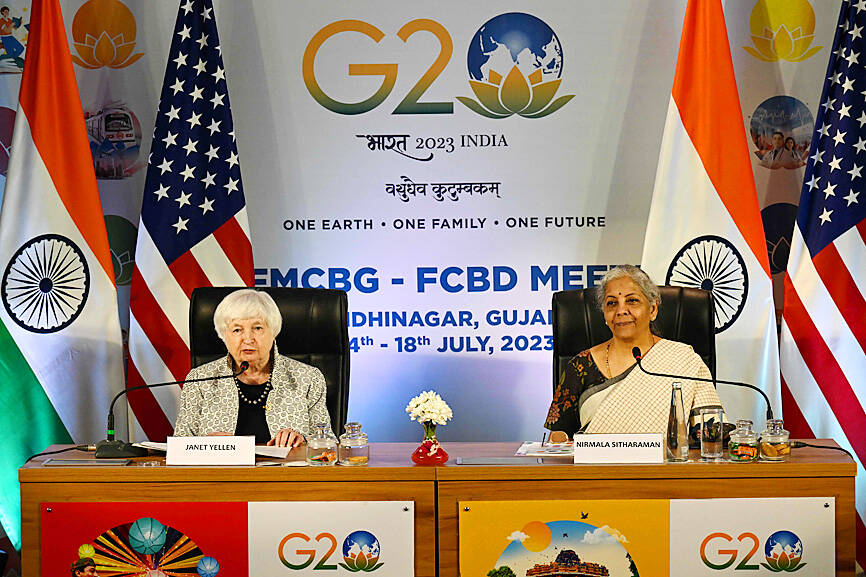G20 finance ministers and central bank chiefs yesterday opened talks on debt restructuring deals, multilateral bank reform and finance to tackle climate change, as they aim to bolster a sagging global economy.
Indian Minister of Finance Nirmala Sitharaman, chair and host of the summit in Gandhinagar, began by telling finance leaders of “the responsibility we have ... to steer the global economy towards strong, sustainable, balanced and inclusive growth.”
Key on the two-day agenda would be “facilitating consensus to intractable issues associated with rising indebtedness,” Sitharaman said earlier in the day, speaking to reporters alongside US Secretary of the Treasury Janet Yellen.

Photo: AFP
Talks would also focus on “critical global issues such as strengthening the multilateral development banks and taking coordinated climate action,” Sitharaman added.
“The world is looking to the G20 to make progress on key challenges like climate change and pandemics as part of our work to strengthen the global economy,” Yellen said.
She also cited work to tackle debt distress among the world’s poorest countries, pointing to debt restructuring progress in Zambia, which she had discussed when visiting Beijing this month.
China, the world’s second-largest economy and a major lender to several stressed, low-income countries in Asia and Africa, has so far resisted a common multilateral understanding on the issue, officials said.
Yellen on Sunday said that the Zambia deal had taken “too long to negotiate,” adding that she hoped debt treatments for Ghana and Sri Lanka could be “finalized quickly.”
“We should apply the common principles we agreed to in Zambia’s case in other cases, rather than starting at zero every time,” Yellen said. “And we must go faster.”
More than half of all low-income countries are near or in debt distress, double the case in 2015, she added.
A top official from G20 chair India said there had been a “not so encouraging response” from Beijing on shared debt understanding.
The G20 members would also discuss multilateral development banks’ reform, cryptocurrency regulations, and making access to financing to mitigate and adapt to the effects of climate change easier.
“In the Global North, climate change means emissions reductions,” World Bank president Ajay Banga wrote in an op-ed ahead of the meeting.
“But in the Global South, it is a matter of survival, because hurricanes are stronger, heat-resistant seeds are in short supply, drought is destroying farms and towns, and floods are washing away decades of progress,” he wrote.
A newly agreed first step on a fairer distribution of tax revenues from multinational firms reached by 138 countries last week is also set to be delivered.
Multinationals, especially tech firms, are able to shift profits easily to countries with low tax rates even though they carry out only a small part of their activities there.
There is also concern that developed G7 member countries’ focus on Russia’s invasion of Ukraine might derail a final consensus agreement, although Yellen has said she would “push back” on criticism that there was a trade-off between aid to Kyiv and developing nations.
Japanese Minister of Finance Shunichi Suzuki on Sunday “reconfirmed the G7’s unshakeable support” to Ukraine, adding that Moscow should also “pay long-term reconstruction costs.”
Any discussion on Ukraine is awkward for India, which has not condemned Russia’s invasion, but is also part of the Quadrilateral Security Dialogue alongside Australia, the US and Japan.

Vincent Wei led fellow Singaporean farmers around an empty Malaysian plot, laying out plans for a greenhouse and rows of leafy vegetables. What he pitched was not just space for crops, but a lifeline for growers struggling to make ends meet in a city-state with high prices and little vacant land. The future agriculture hub is part of a joint special economic zone launched last year by the two neighbors, expected to cost US$123 million and produce 10,000 tonnes of fresh produce annually. It is attracting Singaporean farmers with promises of cheaper land, labor and energy just over the border.

US actor Matthew McConaughey has filed recordings of his image and voice with US patent authorities to protect them from unauthorized usage by artificial intelligence (AI) platforms, a representative said earlier this week. Several video clips and audio recordings were registered by the commercial arm of the Just Keep Livin’ Foundation, a non-profit created by the Oscar-winning actor and his wife, Camila, according to the US Patent and Trademark Office database. Many artists are increasingly concerned about the uncontrolled use of their image via generative AI since the rollout of ChatGPT and other AI-powered tools. Several US states have adopted

A proposed billionaires’ tax in California has ignited a political uproar in Silicon Valley, with tech titans threatening to leave the state while California Governor Gavin Newsom of the Democratic Party maneuvers to defeat a levy that he fears would lead to an exodus of wealth. A technology mecca, California has more billionaires than any other US state — a few hundred, by some estimates. About half its personal income tax revenue, a financial backbone in the nearly US$350 billion budget, comes from the top 1 percent of earners. A large healthcare union is attempting to place a proposal before

KEEPING UP: The acquisition of a cleanroom in Taiwan would enable Micron to increase production in a market where demand continues to outpace supply, a Micron official said Micron Technology Inc has signed a letter of intent to buy a fabrication site in Taiwan from Powerchip Semiconductor Manufacturing Corp (力積電) for US$1.8 billion to expand its production of memory chips. Micron would take control of the P5 site in Miaoli County’s Tongluo Township (銅鑼) and plans to ramp up DRAM production in phases after the transaction closes in the second quarter, the company said in a statement on Saturday. The acquisition includes an existing 12 inch fab cleanroom of 27,871m2 and would further position Micron to address growing global demand for memory solutions, the company said. Micron expects the transaction to